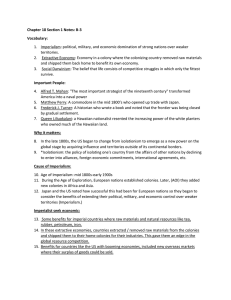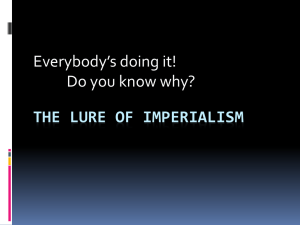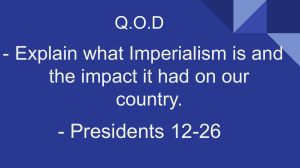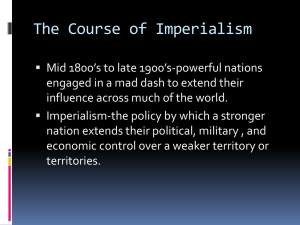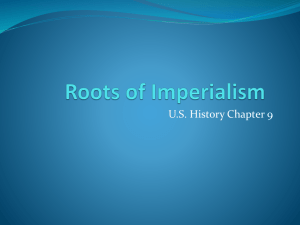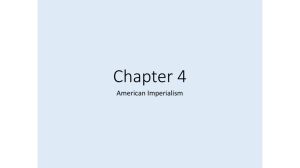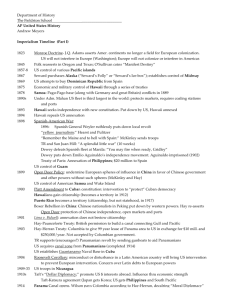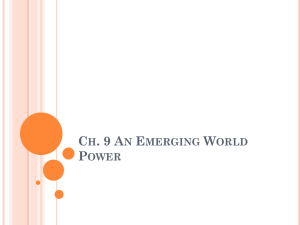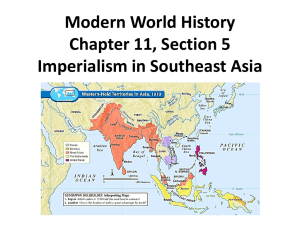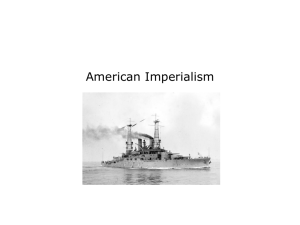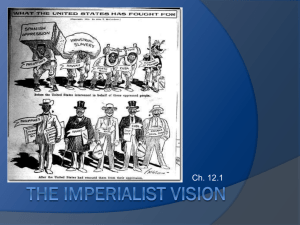Imperialism: Causes, Effects & US Expansion
advertisement
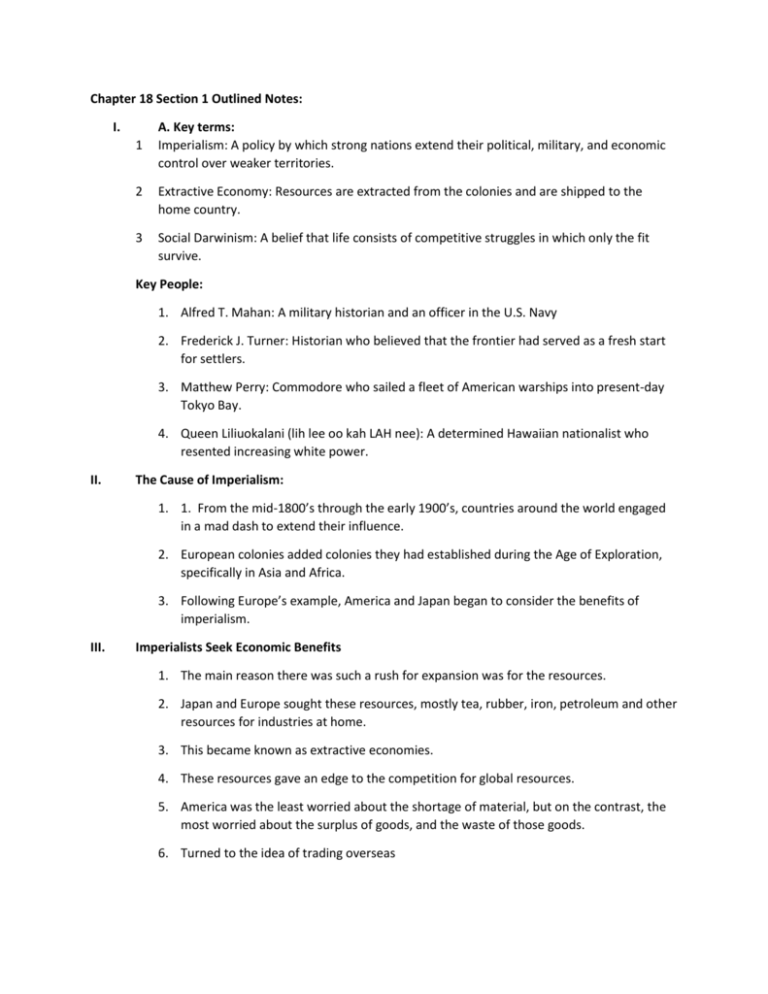
Chapter 18 Section 1 Outlined Notes: I. 1 A. Key terms: Imperialism: A policy by which strong nations extend their political, military, and economic control over weaker territories. 2 Extractive Economy: Resources are extracted from the colonies and are shipped to the home country. 3 Social Darwinism: A belief that life consists of competitive struggles in which only the fit survive. Key People: 1. Alfred T. Mahan: A military historian and an officer in the U.S. Navy 2. Frederick J. Turner: Historian who believed that the frontier had served as a fresh start for settlers. 3. Matthew Perry: Commodore who sailed a fleet of American warships into present-day Tokyo Bay. 4. Queen Liliuokalani (lih lee oo kah LAH nee): A determined Hawaiian nationalist who resented increasing white power. II. The Cause of Imperialism: 1. 1. From the mid-1800’s through the early 1900’s, countries around the world engaged in a mad dash to extend their influence. 2. European colonies added colonies they had established during the Age of Exploration, specifically in Asia and Africa. 3. Following Europe’s example, America and Japan began to consider the benefits of imperialism. III. Imperialists Seek Economic Benefits 1. The main reason there was such a rush for expansion was for the resources. 2. Japan and Europe sought these resources, mostly tea, rubber, iron, petroleum and other resources for industries at home. 3. This became known as extractive economies. 4. These resources gave an edge to the competition for global resources. 5. America was the least worried about the shortage of material, but on the contrast, the most worried about the surplus of goods, and the waste of those goods. 6. Turned to the idea of trading overseas IV. Causes of imperialism a. Economic Gain: 1. Industrialists want raw materials for industries in their home countries. 2. Entrepreneurs want to sell their goods and invest in new overseas markets b. Militarism 1. Colonial powers seek bases for naval forces that protect their global trade networks. c. National and Social Darwinism 1. Imperialists feel a moral duty to spread their culture to people they consider inferior. V. Senator Albert J. Beveridge: “Today we are raising more [crops] than we can consume. Today we are making more than we can use…Therefore we must find new markets for our produce, new occupations for our capitol, new work for our labor.” -Senator Albert J. Beveridge, “The March of the Flag,” 1898 VI. Imperialists Stress Military Strength a. To expand and protect their interests around the world, imperialists built up their military strength b. Alfred T. Mahan believed that lots of powerful nations owed their victories to navies. He believed that the U.S. had to modernize their ships and also control foreign naval bases for refueling and fresh supplies. c. Influenced by his ideas, the ships were rebuilt to be steel plated, steam fueled battleships. d. By 1900, the U.S. had the third largest navy in the world. VII. Imperialists believe in National Superiority a. To justify imperialism, imperialists used ideas of racial, national, and cultural superiority. 1. Social Darwinism: Certain nations and races were superior to others and therefore destined to rule over them b. One reason they thought this way was because they felt God had already granted them the land, which they called “Manifest Destiny”. c. “Throughout American history, the frontier had traditionally supplied an arena where ambitious Americans could pursue their fortunes and secure a fresh start. It had thus served as a ‘safety valve’, siphoning off potential discontent” (Frederick J. Turner “The significance of the Frontier in American History”). Americas first step towards world power a. Beginning in the mid-1800, America focused more on expanding its trade and acquiring new territories. One of America’s first moves towards world power was before the Civil War. U.S. power grows in the pacific a. Matthew Perry was the first to push American power to the Pacific. He sailed a fleet of ships to the closed off parts of Japan. Due to seclusion from the world, Japan realized VIII. IX. X. XI. XII. XIII. XIV. they had fallen behind in military technology. Japanese people described their steam ships as “giant dragons puffing smoke.” b. After entering, Perry won the favor of the emperor with gifts and within a year, had signed a treaty, opening up the ports to trade. Seward purchases Alaska a. In 1867, Secretary of State William Seward bought Alaska from Russia for $7.2 million b. This purchase was looked at as unnecessary and earned the nickname “Seward’s Folly” due to Alaska being known for being a vast tundra. c. This purchase actually doubled America’s size, extended the reach out in the Pacific, and was rich in timber, oil and other resources. U.S. influence in Latin America grows 1. James Blaine, Secretary of State, expanded even further into Latin America by sponsoring the first International Pan-American Conference in 1889. 2. This was to discuss the benefits of economic cooperation, and helped to pave the way for the construction of the Pan-American Highway system. The U.S. acquires Hawaii 1. Hawaii had been a central point for America. It became a stopping point between East Asia and America. Christian churches were set up there. American sugar Plantations were owned there as well 2. In 1887, American planters convinced King Kalakaua (kah LAH kah oo ah) to change Hawaii’s constitution so that voting was limited to wealthy landowners, which were of course, white planters American Planters increase their power a. American planters faced two problems 1. A new U.S. tariff law imposed duties on previously duty-free Hawaiian sugar. This made Hawaiian sugar more expensive than U.S. sugar. 2. Queen Liliuokalani resented white planters, and abolished any political right to the white minority. b. Responding to this, the white planters overthrew the queen, with the help of the Marines. c. Under the control of the wealthy planter, Sanford B. Dole, President Benjamin Harrison was asked to annex Hawaii. The U.S. annexes Hawaii a. President Harrison signed a treaty of annexation but couldn’t get the required senate vote before Grover Cleveland became president. b. After a full investigation, Cleveland found out that most Hawaiians did not support annexation. Later he apologized for the “flagrant wrong doings done by the reprehensible conduct of the American minister. c. After William McKinley became president, he favored annexation and after the outbreak of the Spanish-American war, congress proclaimed Hawaii an official U.S. territory.
